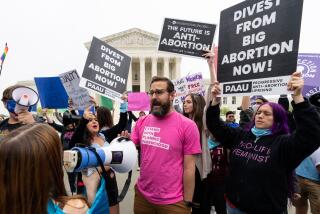States Not Required to Provide Free Lawyers for Death Row Inmates, Justices Rule
- Share via
WASHINGTON — The Supreme Court ruled Friday that states do not have to provide a free lawyer to all Death Row inmates who are facing execution.
The justices, on a 5-4 vote, said that the Constitution gives defendants a right to have a lawyer during the time they are tried, sentenced and appealing their convictions to the state’s highest court. But at that point, the state’s obligation ends, Chief Justice William H. Rehnquist said.
The decision means that in some states, such as Virginia, Death Row inmates may face an impending execution with no legal help to file further appeals in state courts.
However, in California, as well as 17 of the 37 other states that allow capital punishment, convicted murderers are provided with a free lawyer for a second round of legal appeals.
Friday’s ruling is in line with Rehnquist’s view that the appeal process for Death Row inmates drags on too long. An inmate may raise a constitutional challenge to his conviction or sentence in state court and gain a hearing on that. If the challenge is rejected, the inmate can raise the same issue in a federal court. The result typically is years of appeals.
In a speech last year to the American Bar Assn., Rehnquist said that even those Death Row inmates who are executed in the United States usually have had eight years of appeals after they were sentenced to die.
However, the ABA and the National Assn. of Criminal Defense Lawyers pointed out in court briefs that many death sentences are overturned on appeals because of flaws in the defendant’s trial or sentencing hearing. ABA President Robert Raven, a San Francisco lawyer, called the court’s decision “regrettable” and said that the association will continue to urge states to provide lawyers for inmates facing death.
The ruling was the second in two days in which the conservative high court majority gave a narrow reading of the Sixth Amendment’s guarantee of right to counsel. The justices said Thursday that the government may freeze the assets of drug dealers and racketeers before their trial, even if this leaves them without enough money to hire a lawyer.
Virginia, Nebraska, Nevada and Pennsylvania are the only states that have no policy of providing lawyers to Death Row inmates to file further appeals after their convictions have been upheld. Virginia gives inmates only the right to use a law library.
Both a federal judge in Richmond and the appeals court there concluded that Virginia’s failure to provide lawyers denied the Death Row inmates a “meaningful access to the courts.”
Rehnquist disagreed. He said that there already are ample safeguards to assure defendants a fair trial and a right to appeal their convictions. The Constitution does not demand “additional safeguards,” he said.
He was joined in the opinion by Justices Byron R. White, Sandra Day O’Connor and Antonin Scalia. Justice Anthony M. Kennedy also concurred.
The four dissenters said that the court had denied “simple fairness” in the case (Murray vs. Giarratano, 88-411) to those inmates who face execution.
More to Read
Get the L.A. Times Politics newsletter
Deeply reported insights into legislation, politics and policy from Sacramento, Washington and beyond. In your inbox twice per week.
You may occasionally receive promotional content from the Los Angeles Times.











